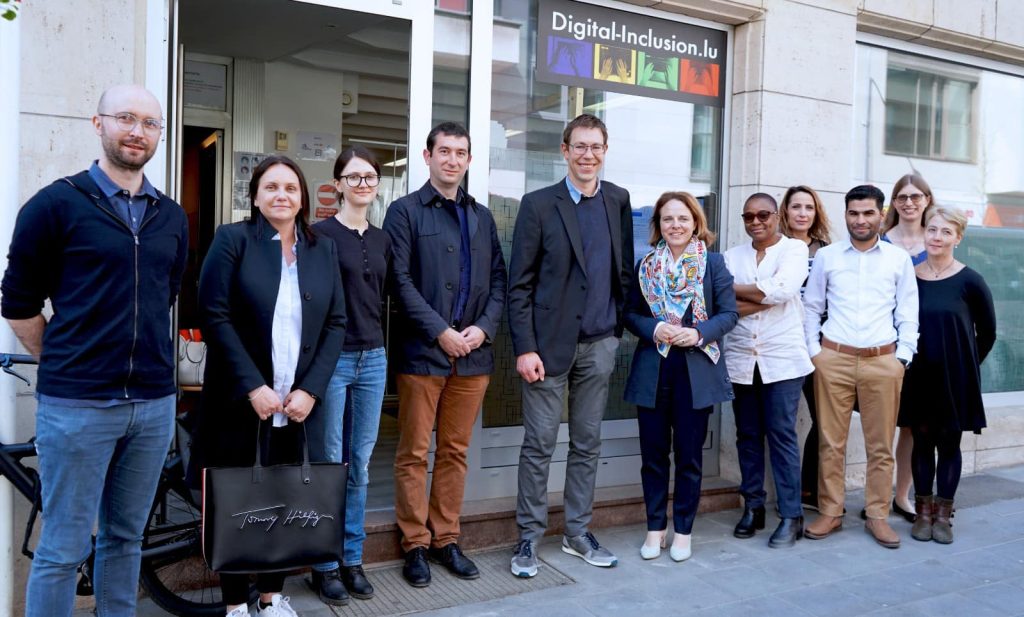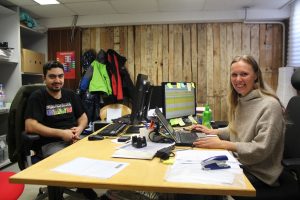In 2017, the project was further developed by Anna Szymanska and Patrick de la Hamette, and a third part time employee joined the project, helping to prepare our digital skills and workforce insertion project with the Ministry of Labour and the European Social Fund.
At the same time, the ‘Hariko building’ neared its end-of-life, as it was only a temporary solution and the building was to be removed in 2018. Digital Inclusion managed to find a new spot, and again it is a building that we could temporarily (until end of 2018) use and meanwhile has been torn down- this allowed us to get a lot of space while keeping rent costs low. During three months, we prepared the space and then moved in January 2018- You can find more about how we re-used this building space here.
2018
In 2018, Digital Inclusion started its ‘Digi4All’ project (2018-2019), on its new premises in Howald. The project augmented our project by adding a multitude of educational offers, aiming to boost digital skills of people without employment in Luxembourg, and is financed by the Ministry of Labour and the European Social Fund. (more details here) The staff grew to 8 employees (part time).
Later in 2018, Digital Inclusion also started its new circular economy program ‘iCycle‘ (funded by the Oeuvre GD Charlotte in its ‘Yes We Care’ program), with the goal to reinforce its efforts on re-use for smartphones and re-use principles in general. As always, the projects are based on transparent action, allowing to raise awareness, in this case on circular economy. In a collaboration with Caritas, smartphones are now being collected by the ‘mobile bag’, a project developed by Caritas Luxembourg. Caritas also collects older phones for recycling disassembly, and helps allocate smartphones (refurbished and distributed by Digital Inclusion, along with specific training) to people in need, in Luxembourg.
2019
In the beginning of 2019, Digital Inclusion moved again, this time to a non temporary address, just next to Gare in Luxembourg, allowing easy access for our national network of beneficiaries. To cover the new rent, the City of Luxembourg and the Oeuvre GD Charlotte provided extra funding.
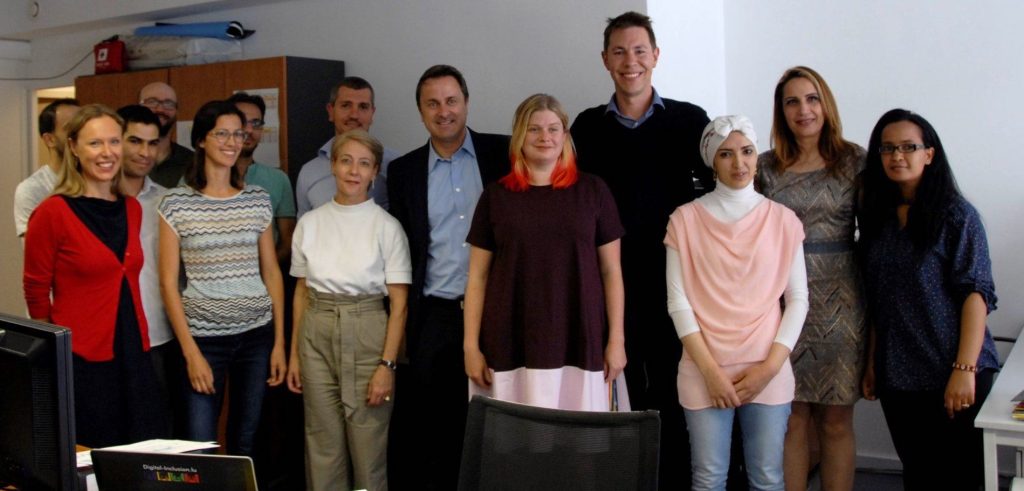
While we successfully completed the second half of our ‘Digi4All’ mission with the Ministry of Labour, numerous Ministers visited Digital Inclusion, including Corinne Cahen, Carole Dieschbourg and Xavier Bettel, and we asked to initiate talks for government support, for a long term funding of the project (the Oeuvre funding being limited in time).
2020
In 2020, Digital Inclusion started it’s new 2-year program ‘DigiCoach’ with the Ministry of Labour and the European Social Fund. This is a follow up to our educational program ‘Digi4All’, and includes new elements, such as a computer software assisted language lab (allowing our beneficiaries to learn on their own pace with state of the art software) and also a direct job search coaching. Other elements, such as our very successful digital literacy classes, were refined. In the beginning of March, EU commissioner Nicolas Schmit visited our project, to see Digi4All (and all of our other projects) in action.
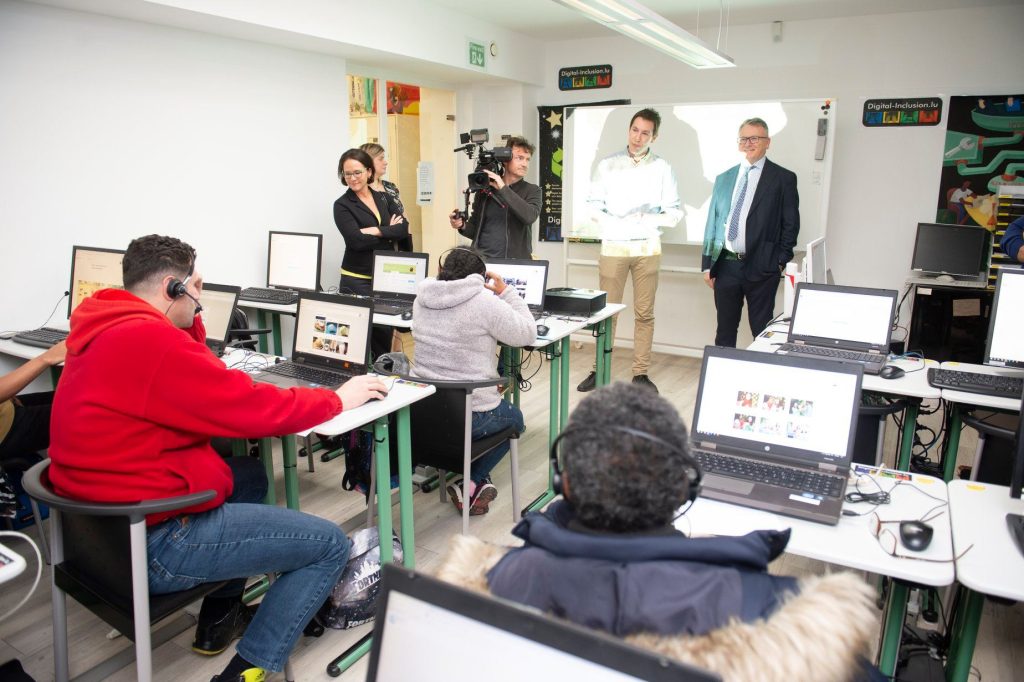
With the Covid related measures, such as the school closure, starting mid March, Digital Inclusion also had to quickly adapt to the new situation. Our classroom and front office were closed at the same time than the schools, and in the following days our operations were shifted into home office.
In the new situation, Digital Inclusion decided to take action and set up an extraordinary distribution to help students in home schooling, when their household could not afford a computer. This was made possible by considerable extra efforts of the staff and by external help of the Lions Club Luxembourg Viaduc, who delivered computers all over the country, while the Automobile Club Luxembourg established a drop off point for donations, allowing our supporters to continue to donate IT devices to us.
A while after Luxembourg’s school re-opened, we also re-opened our class room, but only with a reduced number of students and high safety standards.
2021
In 2021 we continued to operate with high security standards in face of the covid pandemic. In order to reach our targets despite a smaller number of students allowed in our classroom, the team put in many extra efforts and organised additional classes.
Digital Inclusion Asbl was honoured to receive a visit from His Royal Highness the Grand Duke on Wednesday 9th June 2021.
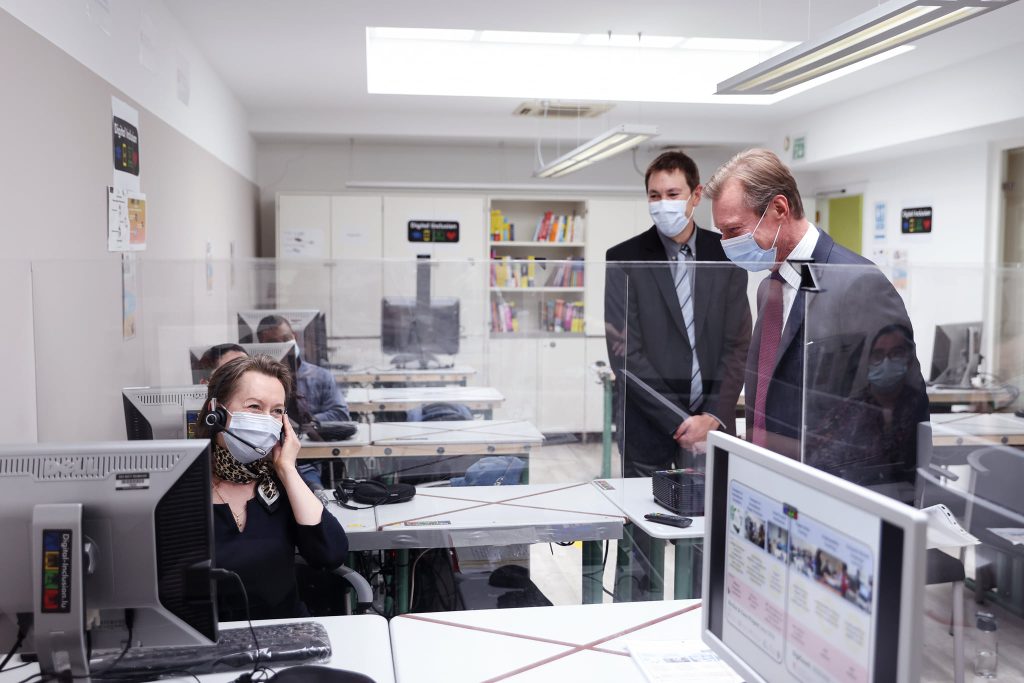
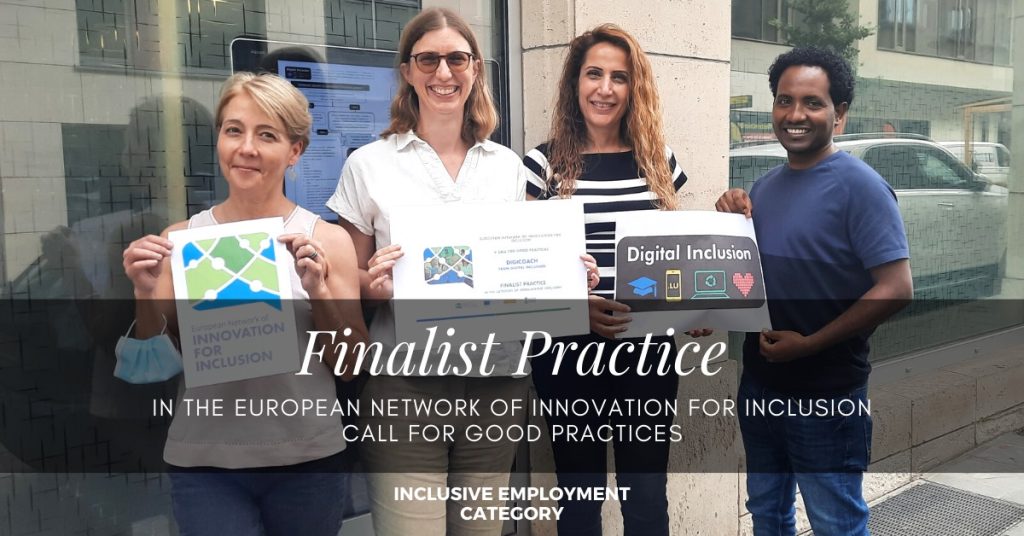
Digital Inclusion is proud to have received the Finalist Prize ![]() in the ‘European Network of Innovation for Inclusion’ Call for Good Practices 2021, in the Inclusive Employment category.
in the ‘European Network of Innovation for Inclusion’ Call for Good Practices 2021, in the Inclusive Employment category.
This prize is an excellent way to conclude our collaboration with the Ministère du Travail Luxembourg and the European Social Fund that had started in January 2018 with our “Digi4All project.” We thank them for these four years of successful collaboration!
Digital Inclusion was also financed by the Oeuvre Nationale de Secours Grande-Duchesse Charlotte from 2016 until 2021.
2022
In January 2022, we signed a convention with the Ministry of Family Affairs and Integration. This convention now covers the financing of all activities of Digital Inclusion from 2022 on. We continue to extend our links with ONIS and the Offices Sociaux (welfare offices)
On February 24th, we saw the invasion of Ukraine by Russia, resulting in over 5000 displaced persons arriving in Luxembourg from Ukraine within a few weeks. As we had received 600 laptops from BGL BNP Paribas just a few months before, we could increase out relief effort for refugees right away. We additionally started a call for action, resulting in many more companies and institutions making laptop donations. From the government, we received 65 laptops from CTIE, as well as 270 laptops from CGIE (via a convention allowing high schools’ de-commissioned laptops to be transferred to us).
On April 27th, we had the honor to receive Minister of Family affairs and Integration, Mme Corinne Cahen in our project. She met with staff and volunteers, and also spoke to refugees from Ukraine and other places, who were receiving their computer on that day.
